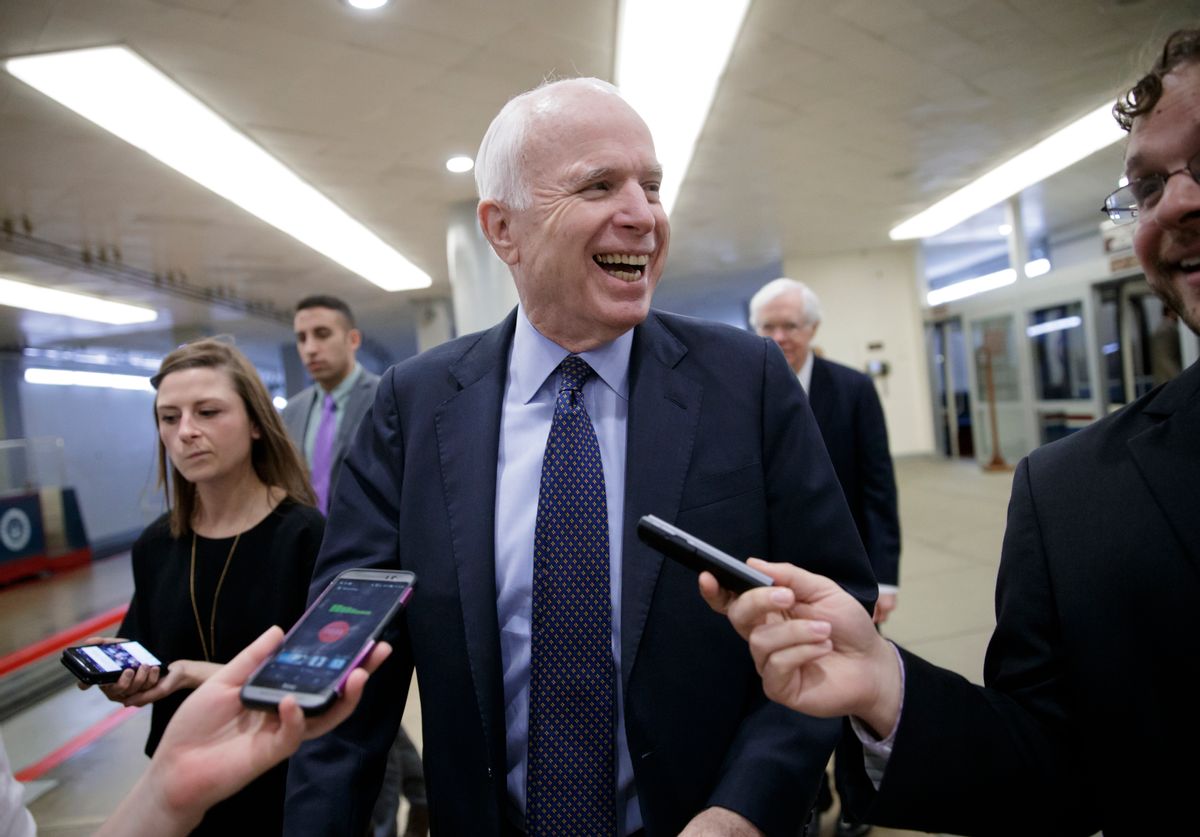Senator John McCain R-Ariz., published an op-ed for the New York Times on Monday and it was titled "Why We Must Support Human Rights." The piece was centered on the blunt nature of Secretary of State Rex Tillerson's view on foreign policy, lecturing him for only looking to advance national interests. McCain delivered an alternative to Tillerson that would more than likely be in good faith, had it not been riddled with blatantly false or amnesic historical illusions of U.S. foreign policy.
McCain wrote:
In a recent address to State Department employees, Secretary of State Rex Tillerson said conditioning our foreign policy too heavily on values creates obstacles to advance our national interests. With those words, Secretary Tillerson sent a message to oppressed people everywhere: Don’t look to the United States for hope. Our values make us sympathetic to your plight, and, when it’s convenient, we might officially express that sympathy. But we make policy to serve our interests, which are not related to our values. So, if you happen to be in the way of our forging relationships with your oppressors that could serve our security and economic interests, good luck to you. You’re on your own.
Only these depictions are attributed as unique to Tillerson and President Trump's administration, when in fact, this is precisely how the U.S. has conducted its foreign policy — something McCain has staunchly supported — for decades. McCain goes on to write the U.S. is a country with "a conscience."
"We have long believed moral concerns must be an essential part of our foreign policy, not a departure from it. We are the chief architect and defender of an international order governed by rules derived from our political and economic values," McCain wrote. But any rational person with even slight historical context of American foreign policy must understand that this is nothing more than a delusion.
Last week after the media was outraged that the Trump administration could invite an authoritarian leader like the President of the Philippines, Rodrigo Duterte, into the White House — contrary to having hosted many worse tyrants in the past — journalist Glenn Greenwald wrote about American foreign policy in a light that is seldom even acknowledged, let alone discussed.
Greenwald wrote in the Intercept:
Since at least the end of World War II, supporting the world’s worst despots has been a central plank of U.S. foreign policy, arguably its defining attribute. The list of U.S.-supported tyrants is too long to count, but the strategic rationale has been consistent: In a world where anti-American sentiment is prevalent, democracy often produces leaders who impede rather than serve U.S. interests. . .
Aside from the fact that the U.S. has spent decades supporting tyrants and despots whose calling card is “extrajudicial killings” — including many who were feted at the White House — the central war on terror approach of the Obama presidency was exactly that. For years, Obama bombed multiple Muslim countries in order to kill people — including his own citizens — who his administration suspected, but never proved, had connections to terrorism. In other words, he killed thousands of people extrajudicially. It takes a special kind of propagandist to claim that this is a new Trumpian innovation.
McCain, who is notorious for being one of the biggest war hawks in Congress, continued to write about America's values and how it's "dangerous" to view foreign policy as "simply transactional." This is the same McCain who voted for the Iraq War, and supported intervention and subsequent regime change in Libya. McCain wrote about not denying the "aspirations of billions of people" but he wanted to halt the Syrian refugee program after a terror attack struck France in 2015. Two months ago McCain met with King Salman of Saudi Arabia where they discussed continuing the decades long friendship between the two nations. It may shock McCain when he learns that Saudi Arabia is one of the most despicable, repressive regimes on the planet. The nation is an egregious violator of human rights and is currently leading a coalition that has allowed millions to die in Yemen either from starvation or from bombings — all with the help of U.S. weapons and logistics.
Above all, McCain writes, "Depriving the oppressed of a beacon of hope could lose us the world we have built and thrived in. It could cost our reputation in history as the nation distinct from all others in our achievements, our identity and our enduring influence on mankind." If McCain was truly this skeptical of Tillerson's ability to be top diplomat for the nation, why didn't he — at the bare minimum — vote against Tillerson during his nomination process? All it takes is a look at McCain's voting record, or a brief glance at the history of American foreign policy to realize that his op-ed hardly stood for anything.



Shares